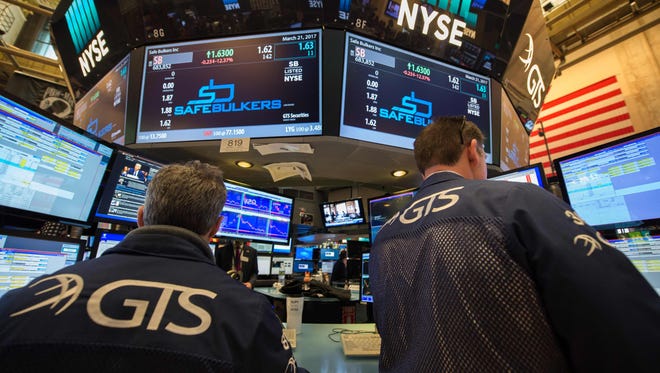Trump urges 'America First' but stock investors should look outside U.S.
Even as President Trump pushes an "America First" agenda, Wall Street pros think it's a good time for investors to look outside the U.S. for stock opportunities.

U.S. stocks have done far better than emerging market equities and global stocks in developed nations since the bull market began in March 2009. Domestic stocks have jumped nearly 250%, while their global counterparts have risen almost 100%, according to Bespoke Investment Group, a Wall Street research firm.
With U.S. stocks trading in overvalued territory after their long rally, investors are likely to reap better returns going forward in places like the eurozone, and in emerging markets like Brazil, and Central and Eastern Europe. These foreign markets now have characteristics that suggest future gains will outpace U.S. returns. Working in their favor? They're selling at more affordable prices, and are home to economies on the upswing and companies poised to post stronger profit growth.
"If investors have additional capital to invest, we believe one of the first areas to target today would be international stock markets," advises Sean Lynch, co-head of global equity strategy at Wells Fargo Investment Institute.
Here's why shifting some cash to overseas stocks makes sense:
* Time to shine. Long market cycles like the one since 2009 when U.S. stock returns topped the rest of the world eventually end. New cycles are accompanied by new leaders. The shift may already be underway. So far this year, the MSCI Emerging Markets index is up 12%, double the 5% gain of the broad U.S. stock market, according to Bespoke.
"Investment returns go in cycles, don't forget that," says Rajiv Jain, manager of GQG Partners Emerging Market Equity fund.
Rather than look at the past and commit cash to stocks that have done the best, investors need to identify where the next wave of better returns will be. "The best opportunities are in markets that have gone through significant pain," he says. "You need two things: cheap stock prices and economies that are improving."
Europe and many emerging markets fit that description, Jain says. He likes stocks in "hard-hit" areas of Eastern Europe, such as Bulgaria and Romania, which are on the upturn. Bulgaria's Sofix index plunged 80% from its 2007 peak during the financial crisis and is still down roughly 65% from its high despite a rebound of roughly 25% in 2016. Romanian shares are also far off their 2007 peak.
* Diversification still makes sense. Having a decent allotment of foreign stocks makes sense, as the U.S. makes up just about half of the world's stock market value. The benefit of not putting all of ones money in one place is this: Investors can smooth out long-term returns and lower risk by owning an array of stocks that go up and down at different times.
"We believe strongly in global stock diversification," says Fran Kinniry, global head of portfolio construction at Vanguard Group. He says investors should have roughly 30% of their stock investments in foreign companies. He stresses that global stocks won't be spared when markets fall.
* Cheaper Overseas. U.S. stocks in the Standard & Poor's 500 stock index are now trading near 20 times earnings, which is above their 10-year average, according to Wells Fargo Investment Institute. By contrast, the MSCI Emerging Markets Index, which includes 23 nations, such as Brazil, Russian and Indonesia, is trading at less than 15 times earnings, which is below its long-term average. Similarly, the MSCI EAFE index, which tracks 21 developed overseas markets in places like Europe, Australia and Japan, is trading around 16 times earnings, or nearly 25% below its 10-year average.
"We find very few places in which international markets look expensive today compared to historical valuations," Wells Fargo's Lynch wrote in a report.
While Audrey Kaplan, co-head of international equities at Federated Investors, likes the lower valuations and improving economies in the eurozone, she feels Europe could be held back by political risk tied to elections in France and other places involving populist anti-European Union candidates, as well as uncertainty tied to the Brexit negotiations between the U.K. and E.U.
"The catalyst to buy is not there until the politics clear up," she says.
* Overseas business trends are improving. When it comes to growth, the Wells Fargo Investment Institute sees the U.S. economy growing at a 2.3% clip this year, which is slower than the 3.3% global GDP estimate. Emerging market growth is forecast at 4.5%, IMF data show..